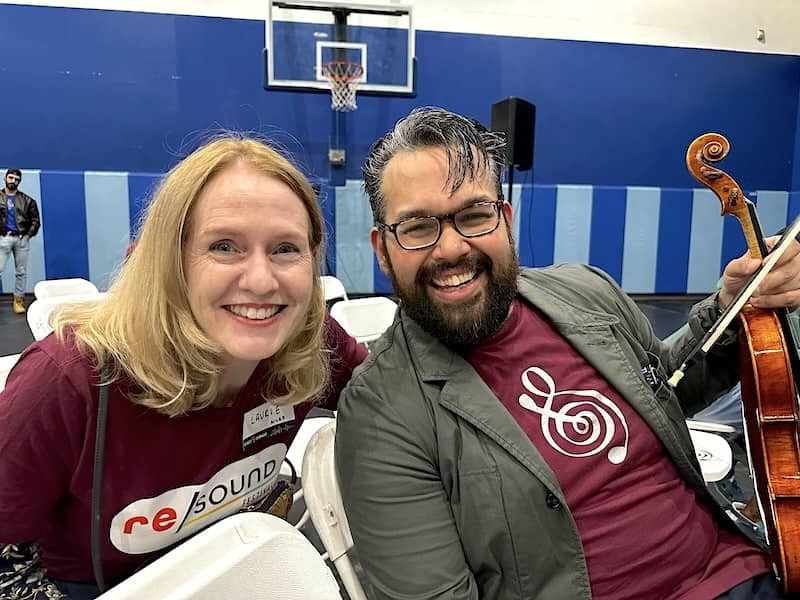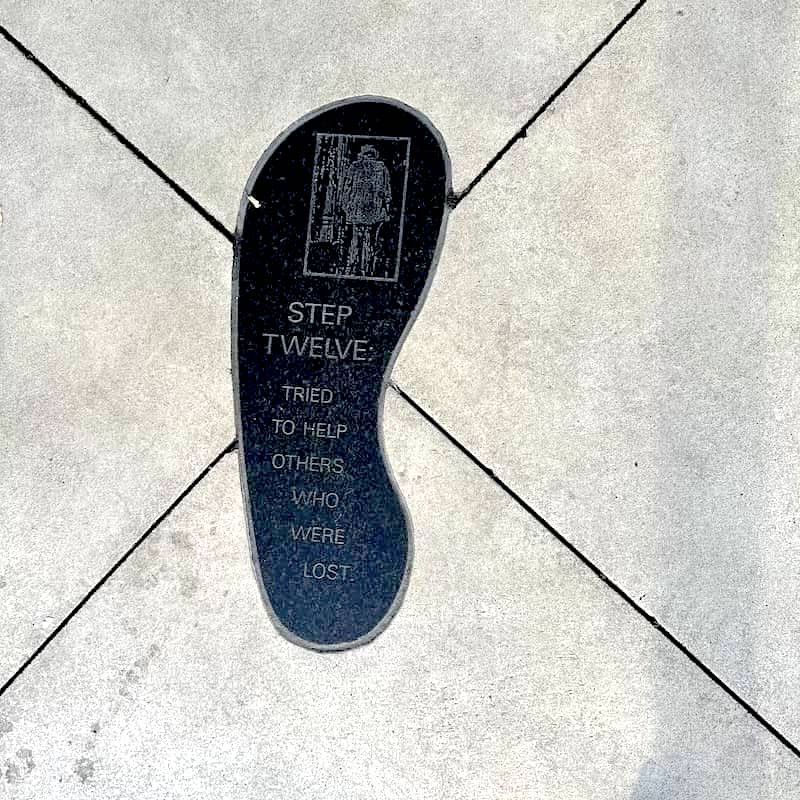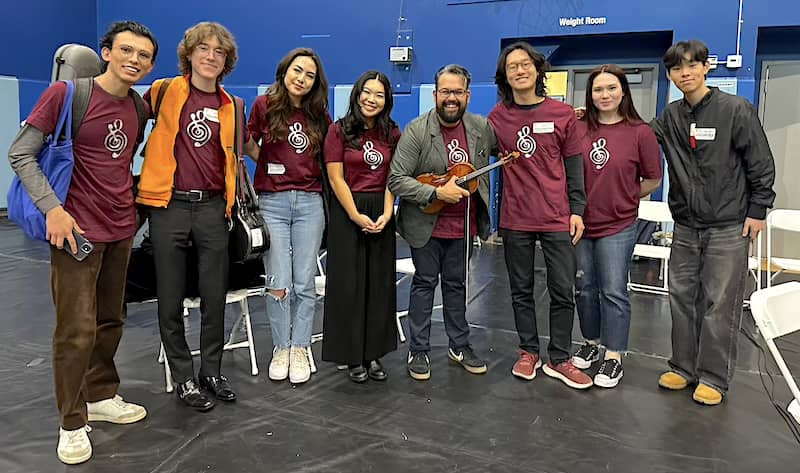“Comfort ye…” The opening words of Handel’s “Messiah,” beautifully delivered by Los Angeles Master Chorale tenor Adam Faruqi, resonated deeply within the Midnight Mission gymnasium. As the afternoon sun streamed through the high windows, the familiar aria felt profoundly comforting, perhaps even more so than within the traditional setting of a church. Here, in the heart of Skid Row Street, the music and its message took on a powerful new dimension, surrounded by the palpable struggles and constant dangers faced by those living on the streets of Los Angeles.
 Vijay conducts Messiah
Vijay conducts Messiah
Vijay Gupta conducts Handel’s “Messiah” at the Midnight Mission in Skid Row.
This concert was held in a place and for a population acutely in need of comfort. The Midnight Mission, a beacon on Skid Row street, stands as one of the nation’s oldest shelters and housing programs, offering vital meals and 12-step recovery programs to those seeking refuge. The “Messiah Project” was a central part of the “Re/Sound Festival,” a day-long event organized by Street Symphony. Founded in 2011 by violinist Vijay Gupta, who left his position with the Los Angeles Philharmonic after receiving a MacArthur Fellowship in 2018, Street Symphony is dedicated to social justice work through music.
 Laurie Niles Vijay Gupta
Laurie Niles Vijay Gupta
Street Symphony founder and director Vijay Gupta and Violinist.com publisher Laurie Niles. Photo by Allan Marks.
The Re/Sound Festival on Skid Row street extended beyond musical performance. Approximately 70 Street Symphony volunteers, many of whom were musicians, dedicated their time to assemble and distribute 700 hygiene kits and serve nearly 800 meals. Furthermore, Street Symphony partnered with the Department of Public Health to provide essential vaccinations to the community.
To attend this impactful event, navigating to Skid Row street presented a stark reminder of the challenges faced daily by its residents. The sidewalks were lined with tents, and individuals pushed carts laden with their worldly possessions. The raw reality of poverty was inescapable, with scenes of people struggling to maintain basic hygiene amidst the harsh environment of Skid Row street. Robert, my husband, drove me to the Midnight Mission, as the neighborhood’s realities made parking alone feel unsafe. Stepping out of the car, I was immediately immersed in an atmosphere of palpable discomfort and desperation. People slept directly on the sidewalk, hunger and substance use were evident, and the air carried the heavy scents of body odor, urine, and underlying fear. Finding the entrance to the Midnight Mission, a sanctuary amidst this chaos on Skid Row street, became my immediate focus, a search for familiarity within an unsettling landscape.
Initially, I approached the wrong side of the building, and it took a moment to locate the entrance to this refuge on Skid Row street. The shelter presents a formidable, wall-like facade, requiring everyone to pass through security to enter. Once inside, a symbolic pathway of recovery unfolded: twelve tiles shaped like large feet, each marking a step of the 12-step program, led through an open atrium into the building’s interior. Looking down, I read, “Step 12: Tried to help others who were lost.”
 Step twelve
Step twelve
Upstairs, within the gymnasium’s padded walls, a sense of safety and sanctuary prevailed. As Handel’s “Messiah” filled the space, certain phrases resonated with renewed significance in this context.
The voice of him that crieth in the wilderness
Prepare ye the way of the Lord
Make straight in the desert a highway – for our God.
The gymnasium, typically a space for basketball and exercise, was transformed into a concert hall. Banners promoting dreams and recovery hung on the walls, now sharing space with the transformative power of music. The musicians, a blend of members from the Los Angeles Philharmonic and Los Angeles Master Chorale, alongside students from The Colburn School, delivered a performance of exceptional beauty and depth.
 Colburn students with Vijay Gupta
Colburn students with Vijay Gupta
Colburn students who played in the “Messiah Project,” with Street Symphony founder Vijay Gupta. Photo by Allan Marks.
As the chorus sang…
And the glory of the Lord
Shall be revealed…
…their voices filled the hall, and a man from the audience walked to the front, carrying a large grey blanket. He wrapped himself tightly, then lay down on the floor facing the orchestra, appearing to settle in for a peaceful rest. As the movement concluded and applause filled the room, I noticed his bare feet extending from under the blanket – he was clapping with his feet, a unique and heartfelt expression of appreciation.
Vijay Gupta addressed the audience, his words emphasizing the profound meaning of their presence on Skid Row street: “Skid Row is a sacred place,” he stated. “When we make music here, it is not entertainment; art and music are a lifeline. Here, there is no separation between us and them; there is only us, all of us, making music together.”
@violinistlaurie From Street Symphony’s “Messiah Project” at @The Midnight Mission in Los Angeles’s Skid Row: Ayana Haviv sings “There were shepherds” and “Gloria”. Directed by Vijay Gupta. #vijaygupta @Street Symphony ? original sound – Violinist.com
The three-hour concert interwove selections from Handel’s “Messiah” with music and stories from current and former residents of Skid Row street. These personal narratives powerfully underscored the life-saving importance of music in their journeys.
Performances included selections from Midnight Strings, a weekly Street Symphony program offering guitar lessons to Midnight Mission residents, and Women’s Voices, a singing and songwriting program for residents of the Downtown Women’s Center.
Midnight Strings, led by Philip Graulty, presented several songs, commencing with “Wayfaring Stranger,” a poignant traditional melody reflecting the experience of “traveling through this world of woe.” They followed with “Midnight Mission,” an original song by Justin Berthelot. Berthelot shared his story before singing, recounting how the Midnight Mission became an unexpected sanctuary during his darkest times. He described arriving at the Mission after hearing it offered food, walking all the way down Main Street to reach this place of refuge. His heartfelt singing conveyed a deep sense of finding home amidst lostness, singing of bells calling lost souls home, and declaring, “I was searching for home, I found home.” Berthelot emphasized the pivotal role of music in his recovery, stating, “if I didn’t have music in my life, I couldn’t be here right now, I’d be lost.”
Midnight Strings then led everyone – choir, orchestra, and audience – in a singalong of their closing song, “Grateful Power, Thank You,” a mantra of gratitude referencing the “greater power,” a core concept in the 12-step recovery program.
Women’s Voices, under the direction of Amy Fogerson, performed their original song, “Break the Cycle.” Their voices gained strength as members of the “Messiah” chorus joined in, creating a powerful echo of the message: “change is an inside job.”
The people that walked in darkness have seen a great light…
The choir repeated these words, their voices filling the gymnasium with a message of hope and transformation. Together, the combined choirs performed both Handel’s “Hallelujah” chorus from 1741 and Leonard Cohen’s contemporary “Hallelujah” from 1984, bridging centuries of musical expression.
The assembled choirs also sang “Listen,” a piece by composer Reena Esmail dedicated to Brian Palmer, a former Street Symphony performer in early “Messiah” projects who passed away in 2019. The piece incorporated a quote from Palmer: “One act of love I know for sure, is to listen.”
On this day in Skid Row street, music and messages intertwined – the pain of isolation, the harsh realities of life, the redemptive power of hope, the strength of community, the importance of accepting help and extending it to others. The Re/Sound Festival powerfully demonstrated how music can bridge divides, foster connection, and encourage us to truly listen to one another, especially within communities like Skid Row street that are often overlooked.
You might also like:
* * *
Enjoying Violinist.com? Click here to sign up for our free, bi-weekly email newsletter. And if you’ve already signed up, please invite your friends! Thank you.
Replies
December 12, 2024 at 08:07 PM · Thank you for sharing this, Laurie. Beautiful, thought-provoking.
This article has been archived and is no longer accepting comments.
Violinist.com is made possible by…
Juilliard 2025 Starling-DeLay Violin Symposium
Violinist.com Shopping Guide
Dimitri Musafia, Master Maker of Violin and Viola Cases
Johnson String Instrument/Carriage House Violins
Laurie’s Books
Discover the best of Violinist.com in these collections of editor Laurie Niles’ exclusive interviews.
Violinist.com Interviews Volume 1, with introduction by Hilary Hahn
Violinist.com Interviews Volume 2, with introduction by Rachel Barton Pine
Subscribe
©Violinist.com · About · Privacy · Contact · Advertise
[
